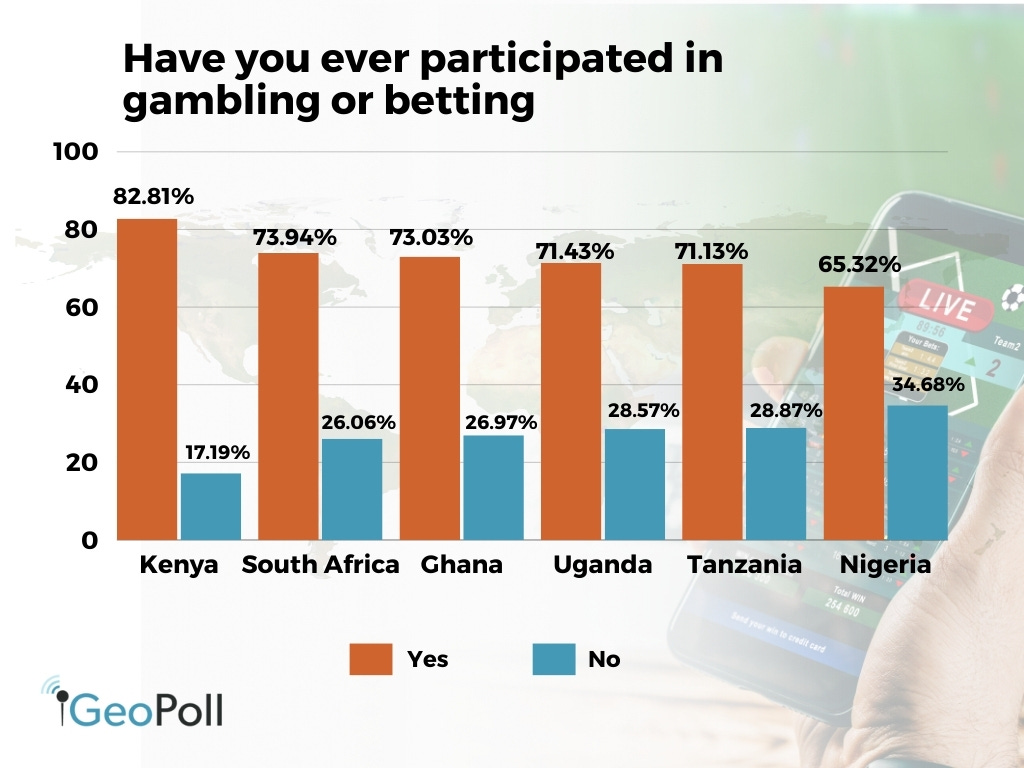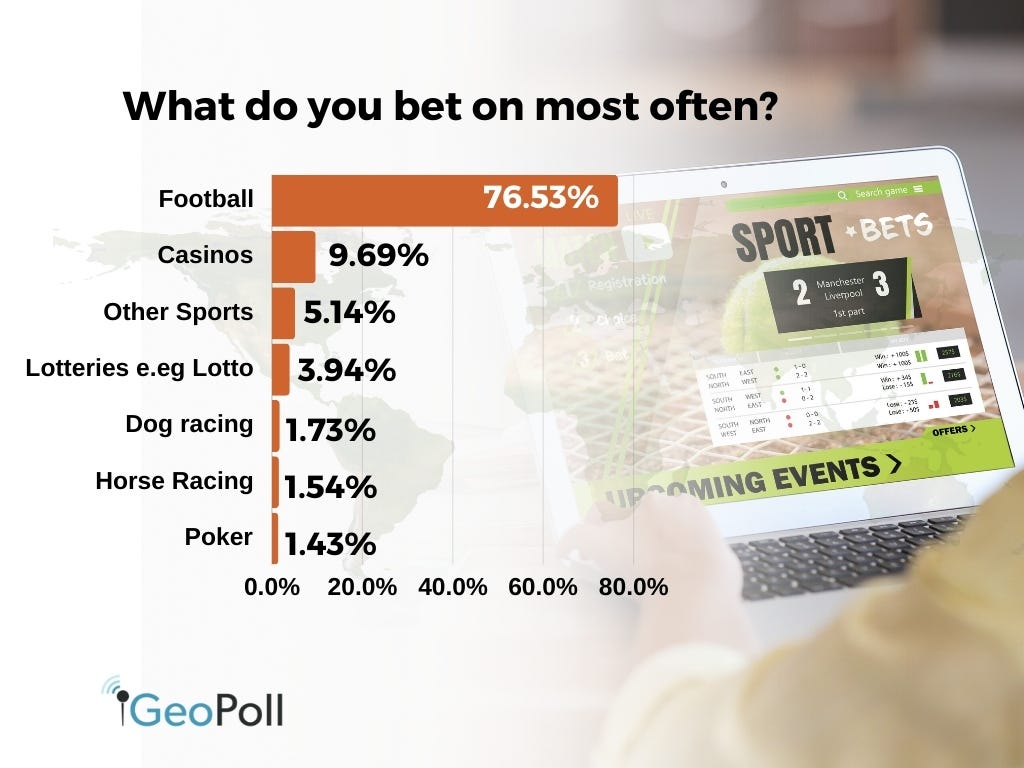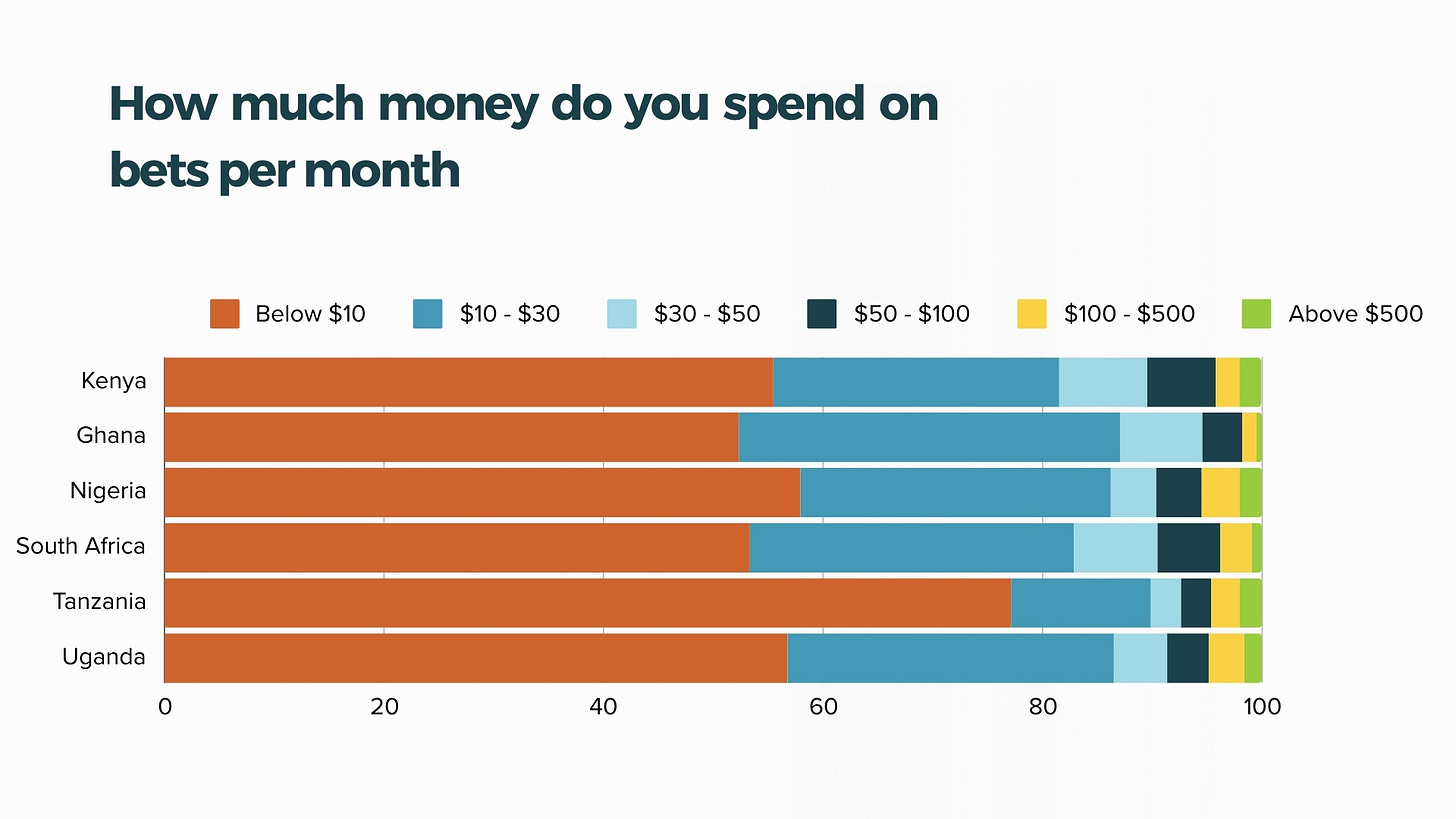Should We Regulate Online Betting, Gambling, and Casinos Like Alcohol and Cigarettes?
Compared to Nigeria, Kenya, and South Africa, people in Tanzania spend the most on betting and gambling, even though their incomes are relatively lower than their peers.
Alright, let’s talk about something that's been on my mind lately: In Tanzania, there are over 100 licensed betting, gambling, and online casino operators. Yep, more than twice licensed fintechs, which is kinda wild when you think about it. Imagine a world where it is way easier to bet than to pay a loan or save, Crazy, right?. On this article, I do not intend to talk about Nigeria where almost 1 Billion goes into betting and gambling everyday, Please read that again.
So, here’s the thing: Benjamin Fernandes (Nala) and Victor Joseph (Tembo) have been saying what a lot of us are thinking—online betting, gambling, and casinos are wrecking the financial future of African youth. It’s not just harmless fun; it’s taking people, especially the ones who are already struggling, down a dangerous financial path. So, let’s cut to the chase: Should we regulate betting, gambling, and online casinos the same way we do alcohol and cigarettes? Let’s talk about it.
Why We Need Some Serious Regulation
Gambling Addiction Is Real, Yo.
Look, we all know that gambling is addictive. The problem is, now you can place bets, spin the slots, or roll the dice from your phone, anytime, anywhere. In Tanzania, you can bet on sports, play online casino games, or hit the slots faster than you can swipe through your Instagram feed. It’s way too easy, and for some people, that’s a huge problem.
What’s even worse? It’s mostly the young people getting sucked into it. They’re chasing that quick win, but what they’re really doing is chasing a dream that’s hard to catch. Some are losing everything they’ve got—money they should be saving for rent or school fees is getting blown on a bad streak. And guess what? The people at the bottom of the financial ladder are hit the hardest. The ones who need financial security the most are the ones getting caught in this mess.
The Real Cost of the Bet
Sure, we hear stories about people who win big, but let’s be real—those stories are rare. For every jackpot winner, there are thousands of people who lose more than they can afford. I know a guy who lost his car to betting, trying to win back money he didn’t have. And I also know someone who made millions from betting. But for the majority? It’s a losing game.
Here’s a thought: what if we had a betting wallet? A separate account where you can only spend what you’ve set aside for gambling. You don’t mix your gambling money with the cash you need for living. That way, you can bet responsibly, without putting your whole life on the line.
Making Betting Transparent
Another thing: online betting, casinos, and gambling are kind of like a maze. The odds are confusing, the terms and conditions are buried in legalese, and some sites don’t make it clear when or how you can actually cash out your winnings. A little bit of regulation could make the whole industry more transparent. People need to know exactly what they’re getting into before they start risking their money. It’s about keeping things fair.
But, Here’s the Other Side of the Coin…
Betting Creates Jobs, Let’s Not Forget That
Okay, let’s be honest—online betting and gambling isn’t all bad. The industry does create jobs and it is a huge industry across Africa. Think about it: tech developers, marketers, customer service reps, payment processors—people are getting paid. In a place like Tanzania, where jobs can be hard to find, betting companies are offering employment to thousands of people.
If we over-regulate, we risk killing the goose that’s laying the golden eggs for people who work in the sector. So while we need some rules, we’ve got to be careful not to go overboard and cut off a major job source.
Adults Should Be Able to Make Their Own Choices
At the end of the day, people are adults, right? They should be able to make their own decisions. That’s why we don’t ban alcohol and cigarettes—because, well, adults can choose what they want to do with their money. If you want to gamble, go ahead, but maybe know when to stop.
But here’s the thing: some people need a little more protection. If you’re prone to addiction or making impulsive decisions, should we let that be your problem, or should we step in and make sure you’re not throwing away your future?
Where Do We Go from Here?
The truth is, we need to find a middle ground. Yes, online betting, gambling, and casinos create jobs, and yes, people should have the freedom to spend their money as they choose. But gambling addiction is real, and it’s affecting the most vulnerable. The solution isn’t a black-and-white “yes or no” thing—it’s about balance.
Here’s an idea: introduce a regulated betting wallet where you can only spend what you’ve set aside for gambling. Make it mandatory for companies to give clear information on odds and payouts. And let’s get more education on responsible gambling. People need to know the risks before they jump in.
And here’s the kicker—this whole industry is powered by mobile money. In Tanzania, mobile money is the backbone of payments for betting, gambling, and online casinos. The way people can move money in and out of their accounts is seamless and instant, which makes it all the more addictive. But with the growth of fintechs across Africa, mobile money could also be the key to introducing better regulation. Mobile wallets and tech could make sure people have control over what they’re spending on gambling, separating it from the money they need for their lives.
So, What Do You Think?
Should we regulate online betting, gambling, and online casinos like alcohol and cigarettes, or should we let people bet as they please? It’s a tough call, but one thing’s for sure: we need to start talking about it before it’s too late. Let’s keep the conversation going, and just remember—bet responsibly. 😉







Yes of course we need to regulate this industry. Why has it taken so long for anyone to raise the issue beyond a few whispers in the corner of the room? Government closed its eyes about 15 years ago when it saw the potential for a vast increase in the tax revenue stream and Mobile Money Operators have been silent for exactly the sane reason.
With all the brains available in the technology industry it would not be difficult to find an effective regulatory system that could work in creating fairness and equity to avoid the unprecedented hurt and misery that is prevalent in the current system.